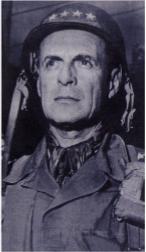
General Matthew B. Ridgway
General Matthew B. Ridgway was born on March 3, 1895 in Fort Monroe, Virginia.
He was the son of Colonel Thomas Ridgway, an artillery officer.
He was graduated from West-Point in 1917 with the rank of Second Lieutenant.
In 1918, he was back to West Point to teach Spanish.
Then, he followed courses at the Infantry School in Fort Bening before taking the command of the 15HT Infantry in China.
Then, he left for Nicaragua where he supervised the free elections in 1927.
Considered as an expert with the Foreign Affairs, Ridgway served in a commission in Bolivia and in Paraguay before working as a military adviser with the Governor of Philippines in 1930. He served from 1935 to 1937 as the commander for the General Staff School at Fort Leavenworth.
General George Marshall was very impressed by Ridgway, he sent him to Brazil for a special mission and then, after the beginning of the war, he served the War Plans Division in Washington.
In August 1942, Ridgway was promoted Brigadier General and took the command of the 82nd Airborne recently created. In spring 1943, he helped the operation of the airborne operation to get ready for the invasion of Sicily which began in July 10, 1943. It was the first airborne operation of the history of the United States.
Ridgway was also responsible for the airborne operations in June 6, 1944, and this time, Ridgway jumped over with his men. The 82nd fought 33 days moving towards Saint Sauveur le Vicomte.
In September 1944, Ridgway took the command of the XVIII Airborne Corps. He led his troops during the invasion of the Rhineland and of the Alsace-Ardenne. On May 2, his troops rejoined the Red Army on the Baltic sea. On June 4, 1945, he was promoted Lieutenant General.
After the war, Ridgway took the command of the forces located in the Caribbean islands from 1948 to 1949.
In 1950, he took the command of the 8HT Army in Korea. He launched a counter-attack in January 25, 1951 and when General MacArthur was called back in April, he was promoted General and Commander-in-chief of the Far East Command.
Ridgway replaced General Eisenhower with the Supreme Allied Commander of Europe in May 30, 1952. His own decision to be surrounded exclusively by American officers instead of other European military chiefs was not the best decision he made, he was called back to the United States and was replaced by the General Joe L. Collins.
He retired in June 1955 and devoted his time to his biography “The Memoirs of Matthew B. Ridgway” (1956).
Matthew Ridgway died in March 1993.